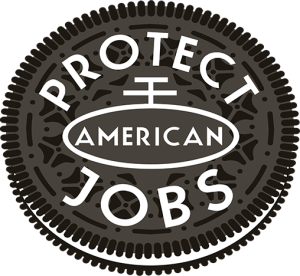A television news crew from Tokyo, Japan traveled to Chicago to interview workers from the Mondelez/Nabisco plant for use in the production of this video examining the effect of free trade policies on workers.
A full translation of the videos is included below.
TV Tokyo: Is Free Trade Policy hurting us?
TPP is in the middle of argument
At the center of the argument, there is one of the popular snack companies called Oreo in the US. Since it moved its production base from the U.S. to Mexico, 600 workers have been laid off. Nabisco has been criticized by presidential contender, Donald Trump, of the Republican Party. The TV news will examine how free trade policy affects workers in the world by examining the example of Nabisco and others.
The following are details about the current situation of Nabisco, the boycott of Nabisco and background of the problem.
Current situation of Nabisco, the company producing Oreo
The Oreo plant was originally located in Chicago, Illinois, and it was operative for more than 60 years. The sales of Nabisco are over $300 billion, and it has 104 years of history. However, Oreos made in Mexico are sold even at places close to the long-established base now.
The Nabisco fired 600 workers to move its production base to Mexico in March because of its low-labor-cost, and this case is causing ongoing debate in the US.
Boycott of made-in-Mexico Nabisco products
A lot of people joined a boycott and rally in front of the house of the CEO of Mondelez International, Inc., the holding company for Nabisco. They asked people not to buy Mexican-made-Oreos, as many people had lost their jobs. Nabisco is selling Oreos at the same price, even though they pay only $4 an hour to Mexican workers.
A background
One background issue is the North American Free Trade Agreement (NAFTA), which is an agreement signed by the U.S., Canada, and Mexico to create a free trade zone. While the agreement has increased the volume of trade in the region, 700,000 people have lost their jobs, and this seems to be one of the results of globalization.
Other examples of taking advantages of low-labor-cost
・jalapeno made in Mexico
・huge airscrews for wind electricity
・Approximately 50,000 Dell computers for a day (parts productions needed high technology and skill such as semiconductor were produced in the US, then assembled in Mexico to save labor costs.)
・Breed cattle in the US after born in Mexico (6% of beef consumption is produced in this way.)
・Nissan, Toyota, Ford, these companies were not exception.
If we follow the request of Donald Trump to make walls between national borders, both the US and Mexico would be devastated. We might need to seek some way to help each other in this society. As TPP covers an area much larger than NAFTA, the TPP agreement will face rough going. Donald Trump promises to withdraw from TPP. TPP itself is not known by many people; Awareness of TPP is 70% in the US, 63% of US citizens know what TPP is and are opposed to this agreement.
